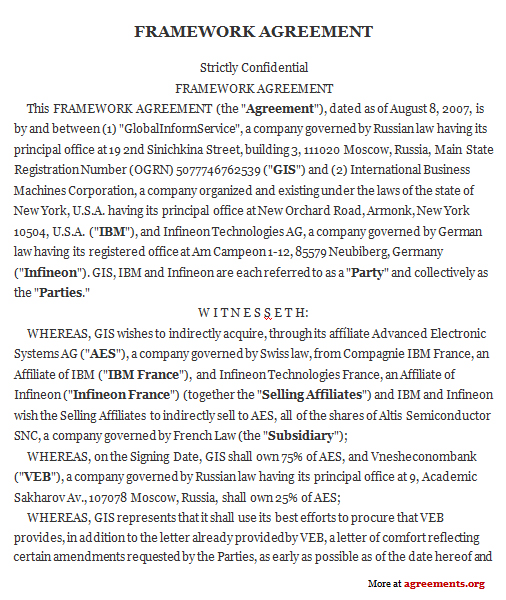what is a framework agreement? A framework agreement is an agreement between two or more business organizations. The terms relating to price as well as quantity in the contract being awarded for a particular project carried out in a specific period are mentioned in this contract. If the agreement is between two parties, then it is known as a bipartite agreement. The agreement defines how the transactions or deal with respect to a particular task has to be carried out for the duration of the agreement.
The benchmark with regard to quality, price and quantity of the commodity being supplied is mentioned here. As the name suggests, the basic parameters for a business relationship are set before a formal contract is signed. Terms and conditions can be modified or deleted as necessary at a future date.
When Do You Need a Framework Agreement
A framework agreement is prepared when two or more business organizations have decided to frame agreements for a task based on what has been agreed upon till date. The purpose of this agreement is to create a broad framework as to how a given task will be implemented with regard to pricing, quality, and quantity. The concerned parties to this agreement are willing to do business and want to start the business through this agreement. The required modifications or deletions to the agreement can be carried out by the parties to the agreement through mutual consent at a future date.
Inclusions in a Framework Agreement
There may be two or more parties involved in this agreement, so the names of all the parties should be included in the agreement. The agreement should also include the effective date of the agreement, the details of the commodity being transacted, the price at which the delivery will take place and the quantity to be delivered.
The delivery schedule and the point of delivery also need to be mentioned in the contract. The payment schedule will need to be incorporated. There should also be a clause about modification, addition or deletion of any of the terms of the contract.
The applicable laws under whose jurisdiction the agreement is being framed should be also mentioned. The events leading to the termination of the contract should be clearly stated. The rights of inspection of the client need to be mentioned.
How to Draft a Framework Agreement
While drafting a framework contract, the following points need to be kept in mind:
- The names of the parties to the agreement and the relationship shared between them.
- The duration of the agreement needs to be mentioned and the procedure for any additions, amendments or deletions to the contract
- The product or service which is going to be provided, the quality parameters and delivery schedule
- The laws of the state under whose jurisdiction this agreement is being framed
- The events which lead to revocation of the contract
- The rights and responsibilities of the parties to the contract
- The terms of appointment of a work contractor which includes the responsibilities as well as the remuneration
Benefits of Framework Agreement
The benefits of having a framework contract are as under:
- The business organization who are almost in full agreement with respect to a particular task or project can list the basic outline of how the business is going to be carried out and start the project. This will save them a lot of time and money compared to if they waited to agree completely on every aspect of the project.
- There is a lot of flexibility with regards to such agreements as they are in the form of a broad framework of how the project will be completed. The terms and conditions in the agreement are amenable to change at any point of time through mutual agreement of all the parties involved.
- The interest of all the parties to the agreement are protected
Key Terms in a Framework Agreement
The key terms of this agreement are mentioned below:
- Acceptance certificate: This is issued when the product or services has been tested to the satisfaction of the client
- Average price: The average price for the products or services over the last 12 months
- Contractor: The person appointed by the parties to the agreement to oversee the production
- Contract period: The start date to the termination date of the contract
- Dependency: Specific actions to be taken by the client as set out in the agreement
- Dispute resolution procedure: The method of resolving any disputes relating to the contract
- Regulatory authority: The statutory bodies who regulate the industry
Types of Framework Agreement
The different types of framework contract are mentioned below:
- Single supplier framework agreement: There are provisions in such agreements for the contracting authority to request the supplier to refine the requirements stated in the terms of the contract
- Multiple supplier agreements: These agreements have multiple suppliers based on a predetermined scoring method, if one fails to meet the requirements, the next suppliers is selected
- Mini-competitions: These are multiple supplier agreements where mini-competitions decide which supplier will be awarded the contract. The terms of the arrangement are not defined beforehand.
- Multiple competitions: Contracts can be cancelled without an opening competition or calling for mini competitions.
If two or more business organizations want to start a task or a project depending on what has been decided till date, then a framework agreement needs to be made. You can download a contract management framework template sample here.
Sample Framework Agreement
